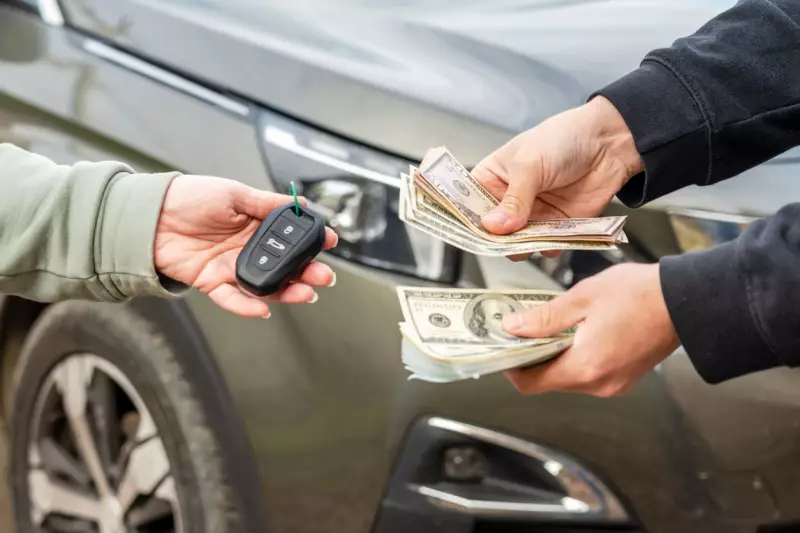A car title is an official document that proves ownership of a vehicle. You will need it when selling your car.
The title, also known as a "pink slip" in some states, contains essential information like your car's Vehicle Identification Number (VIN), style, model, year, etc.
Having a title is usually required when selling a vehicle because it serves as legal proof of ownership. Selling a car without it can lead to fines, legal disputes, and even accusations of fraud.
However, in certain circumstances, it is possible to sell a car without a title, though the process is more complicated.
What Does It Mean When a Car Has No Title?
When a car has no title, it means you lack the official document that proves your ownership of the vehicle. This can happen for several reasons:
- Lost title: You might have misplaced or accidentally destroyed the original title.
- Stolen title: Someone could have stolen the title, perhaps during a break-in or move.
- Never issued: Some older vehicles, especially those made before the 1970s, might not have had a title issued.
- Damaged title: The title could be too damaged to read or use.
Studies show that about 1-in-5 vehicle transfers involve title issues. This shows how common title problems are.
Sometimes, people may need to sell a vehicle without a title, which can complicate the process.
Not having a title can cause serious legal and practical problems:
- Proving ownership: Without a title, it is hard to prove you own the car.
- Transferring ownership: Most states require a title to sell a car without the title or give away a vehicle legally.
- Registration issues: You might not be able to register or renew your registration for a car without a title.
- Legal risks: You could face penalties or even impoundment of your vehicle.
The car title fraud costs consumers and the industry over $11.3 billion annually. This points out why having a valid title is essential and why attempts to sell a car without a title can be risky.
How to Sell a Car Without a Title

Trying to sell a car without the title is complex but can be done. Your options depend on your state's rules.
If you find yourself needing to sell a vehicle without a title, it is essential to understand your local regulations.
Here is a quick roadmap:
- Prove you own the car.
- Check with your DMV (Department of Motor Vehicles).
- Get a replacement title if possible.
- Create a detailed bill of sale.
- Consider selling to a junkyard.
- Be upfront with potential buyers.
- Look into a surety bond option.
Successfully selling a car without a title requires careful planning. According to an Ohio report, auto-related complaints were among the top consumer issues involving title problems.
If you need to sell a car without the title, follow these suggestions.
Verify Ownership
Gather all the documents you have related to the car, such as:
- Vehicle registration
- Insurance papers
- Maintenance records
- Original bill of sale
- Old loan documents
Using a vehicle history report can also help verify ownership. These reports can show the chain of ownership and know any red flags.
It is important if you are trying to sell a vehicle without a title, as it helps establish your right to transfer ownership.
Contact the DMV
Reaching out to your local DMV (Department of Motor Vehicles) is a step when selling a car without the title.
When contacting your DMV:
- Ask about the specific process for your situation.
- Inquire about required forms and fees.
- Find out processing times.
- Ask if there are any alternatives to getting a new title.
The California Department of Motor Vehicles (DMV) has transitioned 35 million vehicle titles to a blockchain-based system. Do not hesitate to ask questions - DMV staff are there to help you to process your documents!
Obtain a Duplicate Title
If you need to sell a car without the title, and you've lost your original title, getting a duplicate is often your best option before proceeding.
The process and fees for obtaining a replacement title vary by state:
- You can apply online or at a DMV office in Florida using the form HSMV 82101. The fee is $75.25.
- In Texas, you must complete the form VTR-34 and pay $2 for a certified copy or $5.45 for a duplicate title. Processing time is about 5-10 business days.
- New York charges $20 for a duplicate title. You can apply online, by mail, or by filling out form MV-902. The process usually takes about 15 days.
- In California, the duplicate title fee is $22, and you can file for an "Application for Duplicate Title" (REG 227)
For the most up-to-date information, check your DMV. They can guide you on how to sell a car without a title in your state.
Draft a Bill of Sale
A detailed bill of sale is when selling a car without the title. Your document should include:
- Vehicle information (VIN or the Vehicle Identification Number, make, model, year)
- Sale price and date
- Buyer and seller details
- A statement that the buyer knows there is no title
Thirty-seven states require a bill of sale for private vehicle transfers. If you need to sell a car without the title, a bill of sale becomes even more important for the transaction.
Sell to a Licensed Junkyard or Salvage Yard
This can be a viable option if you need to sell a vehicle without a title and cannot obtain a replacement.
For instance, the Arizona Motor Vehicle Division (AZ-MVD) permits this practice if the vehicle is 12 years old.
Similarly, Oregon’s DMV allows junkyard sales for vehicles over 20 years old. If interested, visit their office or complete an “Application for Salvage Title.”
To find a reputable junkyard, check their license status with your state's regulatory agency and read customer reviews online. You can also ask for referrals from local auto repair shops.
When selling a car without a title to a junkyard, you must provide a valid government-issued ID and any available vehicle documentation, such as registration papers or maintenance records.
Some yards may require a notarized statement of ownership.
Disclose the Lack of Title to the Buyer
When selling a car without the title, honesty is the key. Be upfront about:
- Why do you need the title?
- Steps you have taken to resolve the issue.
- Potential issues the buyer might face.
If you have a vehicle history report, share it with potential buyers.
Explain any liens or legal issues clearly, including the amount owed and to whom. If there are no car liens, state this explicitly.
Transparency is important if you must sell a vehicle without a title to avoid legal issues and ensure a fair transaction.
Outline your plan to help with title transfer. This might include going to the DMV with the buyer, providing all necessary paperwork, or covering fees for a bonded title.
As stated by Citizens Advice, 28% of used car buyers experienced unexpected problems post-purchase.
If you need to sell a car without the title, it is essential to be upfront with potential buyers about the situation.
Obtain a Surety Bond
In some states, you can get a surety bond to replace a missing title, often called "bonded title," which allows you to sell a car without the title legally.
Here is a breakdown:
- Vehicle appraisal: Get your car appraised by a licensed dealer or appraiser. This determines the bond amount.
- Bond purchase: Buy a bond for 1.5-2 times your car's value from a licensed surety company. For example, a $5,000 car might need a $7,500-$10,000 bond.
- DMV submission: Take the bond certificate and other required documents to your local DMV.
The Illinois Secretary of State's office provides guidelines for their bonded title process:
- You must first apply for a lost title replacement.
- If unsuccessful, you can then apply for a bonded title.
- The bond must be 1.5 times the vehicle's value.
- Bonds must be held for three years.
In What States Is It Illegal to Sell a Car Without a Title?

Selling a car without a title is illegal or highly restricted in many states. Here are some states with strict title requirements:
- Pennsylvania: The state offers a "Certificate of Salvage" for severely damaged vehicles.
- Washington: The Department of Licensing offers a 3-year bonded title for some instances.
- Michigan: The Secretary of State allows for a "TR-205 Ownership Certification" in some circumstances.
While it is generally not advisable to sell a vehicle without a title, some states have processes in place for unusual circumstances.
Selling a car without the title is risky. First, try to get a replacement title. Then, if that is not possible, gather all ownership documents and be honest with potential buyers.
Check your state laws, as some allow bonded titles or junkyard sales. Always be transparent and consider getting legal advice to avoid trouble.
Remember, If you must sell a car without a title, be aware that it may reduce your car's value.




















